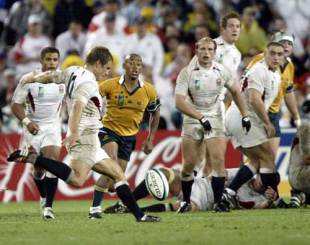Rugby World Cup 2003
Wilkinson drops England to World Cup glory
Jonny Wilkinson slots the winning drop goal in extra time
© Getty Images
World Cup No. 5
10 October - 11 November 2003
Host: Australia
Teams: 20
Format
New Zealand were originally named co-hosts with Australia of the fifth instalment of the tournament. A contractual dispute over ground signage rights between the NZRFU and Rugby World Cup limited however meant that Australia were granted the sole right to host. The 20-team, five-pool format was seen as a successful model and was used again in Australia. A new point-scoring system was introduced however, with bonus points available for scoring four tries or more and losing within seven points.
Pool stages
The pool stages played out largely as expected. Overwhelming favourites New Zealand and England, who had arrived in Australia having won the Grand Slam and victories over the All Blacks and Wallabies on home soil, both topped their groups. England suffered a scare against Samoa when the Pacific Islanders took an early lead, but were clinical against South Africa, their toughest opponent in the pool, to avoid facing New Zealand in the quarter-finals.
However the gap between the 'big eight' nations and those considered as rugby's developing countries narrowed with Ireland holding off Argentina by one point and Fiji came within two points of Scotland in Pool B. Australia narrowly defeated Ireland to win their group, while Wales went close against the All Blacks and France were victorious over Scotland to round out the quarter-finalists.
Knock-out stages
The quarter-finals went largely to the formbook, with England advancing to the semis after a 28-17 victory over Wales. The win was not wholly convincing against a dogged Wales side and England made heavy work of their quarter-final. New Zealand looked the smart money for the Webb Ellis Cup after a convincing display against South Africa. Carlos Spencer was hailed as 'King Carlos' in the nation's press after an outstanding performance in the 29-9 victory. Likewise France had no trouble against Ireland. Les Bleus scored 31 points early in the match to put the game out of reach and finished with a 43-21 victory. Scotland were no match for Australia succumbing to a 33-16 defeat.
The tournament was ignited in the semi-finals with the first real upset of the World Cup. Again New Zealand, the favourites, came unstuck before the final, this time against Australia, a team on paper that had far less talent. After his Man-of-the-Match performance in the quarter-final, Spencer turned villain when his loose pass was intercepted by Stirling Mortlock who scored the decisive try in a 22-10 victory.
Jonny Wilkinson's influence in the England side was fully visible in their semi-final against France. The England fly-half kicked all of England's 24 points - three dropped goals and five penalties. Serge Betsen scored the only try of the match in the 24-7 defeat.
The final
England met Australia at Telstra Stadium in Sydney on November 11 in an epic final. The Wallabies took an early lead when Loti Tuqiri scored a try in the sixth minute. Wilkinson kicked his first penalty goal for England in the 11th minute and England hit the front when he landed another and then kicked a third as the match entered the second quarter of the first half. Jason Robinson's try just before the interval gave England a comfortable 14-5 lead at half-time. The Wallabies roared back through the boot of Elton Flatley. He kicked three penalties in the second half including the equaliser in the 80th minute to force a second extra-time final in the World Cup's history. Wilkinson and Flatley went toe to toe each kicking a penalty in extra-time to once again level the scores. Yet in the 100th minute the fly-half from Frimley, Surrey was immortalised in history when his dropped goal sealed a 20-17 victory handing England and the northern hemisphere their first World Cup.
Player of the tournament
While it will be remembered as a tournament won by Wilkinson's boot, it was Martin Johnson, England's talismanic captain, who guided them all the way to victory. A lock forward who commanded enormous respect from team-mates and opponents, Johnson was the brains and brawn as well as the calm, experienced head among a team packed with talent and leaders. He was a towering presence in the final, stealing several line-outs from the Wallabies, thundering into rucks and providing reassurance when things started to turn against his side.
Frozen in time
In the last 21 seconds fortunes were won and lost. Wilkinson's second attempt at a dropped goal in extra time, and third of the match, sailed through the posts to secure England their first World Cup in five attempts. The match-winning play was a combination of the tried and trusted as well as a flash of inspiration from scrum half Matt Dawson. After Mike Catt's burst upfield from Lewis Moody's lineout take, Dawson dummied and darted forward to take England to within 15 metres of Australia's line. Neil Back and Johnson combined to gain England more ground. Dawson retained possession and at the perfect moment fired the ball to his fly-half who calmly finished off the determined Wallabies after almost 100 minutes of breath-taking rugby.
© Scrum.com


